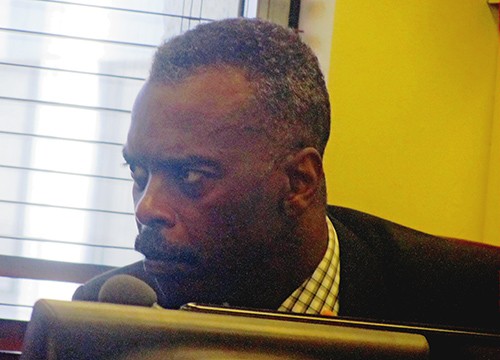
- JB
- new County Commission chair James Harvey
The reign of James Harvey as chairman of the Shelby County Commission will commence in earnest on Monday, and already it is shrouded in controversy — as is the new chairman’s political future.
Harvey, a Democrat, was formally censured Thursday night by the Shelby County Democratic Committee for his decision, among other eyebrow-raising apointments, to name Republican commissioner Heidi Shafer as chair of the Commission’s budget committee, replacing holdover Democrat Melvin Burgess in that role.
The local censure motion was brought by local Democratic committee member Jay Bailey, who is also a member of the state Democratic committee and has declared his intention to file a censure motion against Harvey at Saturday’s meeting of the state committee in Nashville.
The appointment of Shafer, a vociferous opponent of the recent increases in both the budget and the county tax rate that were approved by the Commission majority, is not an isolated circumstance. Harvey, who had earlier joined fellow Democrats in voting for the increases, proposed by County Mayor Mark Luttrell, joined with Shafer and other Republicans in opposing Luttrell’s proposed tax-rate increase on its third reading.
The tax-rate proposal — of $4.38, an increase from the previous rate of $4.02 — narrowly prevailed, but Harvey’s signaling of his opposition had meanwhile earned him enough votes from Commission Republicans to net him the chairmanship over Mike Ritz, who had wanted another term, and Steve Mulroy.
Ritz, who supported Luttrell on both the budget and tax-rate matters, had offended most of the GOP colleagues regarding that issue and a series of others, including his votes with Democratic members on matters relating to the ongoing school-merger issue.
Shafer and two other Republicans, Wyatt Bunker and Chris Thomas, had adopted an Anybody-but-Ritz strategy in voting for the chairmanship, even to the point of supporting liberal Democrat Mulroy in early rounds of the chairmanship voting, which took place at the Commission’s July 9 meeting, where Harvey and fellow Democrat Justin Ford would cast surprise votes, along with most GOP members, to stall the tax-rate increase.
Ford would end up voting for the Luttrell tax rate at the Commission’s next meeting, ensuring its passage, but Harvey, now chairman-elect, continued to oppose it.
Harvey may or may not be able to shrug off the censure votes, one done and one pending, though they could adversely affect his future hopes of winning other public offices as a Democrat. (Harvey, who frequently uses the term “businessman” to define himself and his motives, does, however, have the option of changing his party allegiance — though, at present, that seems a remote prospect.).
But what Harvey must deal with in the short run and can’t shrug off is a Monday vote by the Commission on a motion by Democrat Walter Bailey (perhaps not coincidentally, the father of censure-bearer Jay Bailey)to amend the resolution confirming Harvey’s committee assignments.
That motion, rejecting Shafer and re-appointing Burgess, was voted down in committee last Wednesday when a Republican majority was on hand but could fare differently when considered by the full Commission.
If the Commission’s Democrats, some of whom had supported Harvey for chairman, should vote en masse on Monday for Bailey’s motion, and if they should be joined by Ritz, who has just returned from a family vacation in Russia and professes himself undecided on the appointments issue, Harvey will suffer a serious rebuff to his authority and intentions.
Those inclined to support the new chairman, including the GOP members who determined the shape of Wednesday’s vote, consider Bailey’s motion a threat to Commission tradition; those likely to oppose Harvey have expressed concern about the possibility of trade-offs made by Harvey to secure the chairmanship.
UPDATE: State Democratic committee member Jay Bailey did in fact submit a resolution aimed at censuring Harvey at Saturday’s Democratic executive committee meeting in Nashville. But action on the resolution was deferred until the committee’s November meeting, pending receipt of more detailed information requested by committee members.